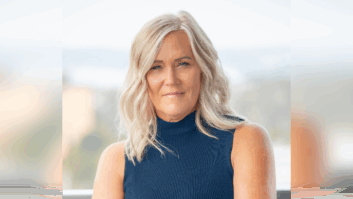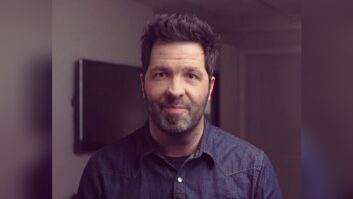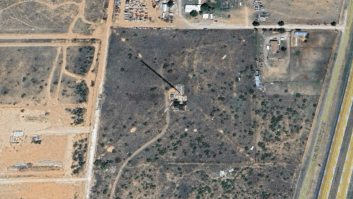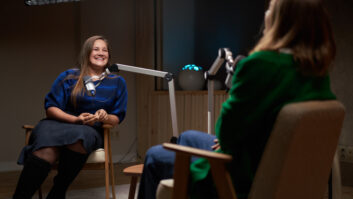
Independent, trustworthy news provided in a community’s local language: That is the goal of Internews, a California-based, non-governmental organization, for every area it works.
In Southern Sudan, as part of furthering the goal of independent local media in the region, Internews has established four community radio stations, some of which are powered by a mix of solar and wind-generated electricity.
“There’s very limited infrastructure in the Southern Sudan, which means there’s no electricity,” said Deborah Ensor, Internews Sudan program director.
“Meanwhile, generators are expensive and they are somewhat difficult to maintain. So we use solar and wind power where we can.”

Internews hired local women to carry more than a ton of equipment up the mountain to build the transmission tower for the Kauda radio station. Photo by Matt Buck/Internews Internews’ most striking Sudanese installation is atop Kauda mountain, a rugged peak in the Nuba Mountains region of South Kurdufan.
The mountaintop site provides a coverage radius of about 45 miles, but there is no easy access to the site. In fact, all the equipment for the facility had to be carried in by hand — or head.
“We had over a ton of equipment that had to go on the top of this mountain, including six batteries that weigh about 60 kilograms [132 pounds] apiece, four mast sections and more than 50 kilograms of tools that we had to haul up and down every day,” said Ensor. “It’s a 90 minute hike to get up the hill in 105 to 110 degree heat.”
The batteries were hauled up the hill by local men; four to a battery. The rest was carried by local women, who carried 40 to 70 pounds of equipment on their heads, apparently without breaking a sweat.
“They are laughing and singing along the way, and it was very easy for them,” said Ensor. “Me, I’m just carrying a bottle of water and I was worn out by the time we got to the top.”

Solar panels help power the station Voice of Community in Kauda. Photo by Matt Buck/Internews Promoting peace
At the base of the mountain, the station’s facility is powered by a mix of solar power and a generator.
By using solar and wind power, the Kauda site is entirely self-sufficient. So are the radios — hand-cranked sets provided by international aid agencies in the region — used by their audience.
Via reports and other content gathered by the residents themselves, the Internews audience has access to independent news that reflects their communities’ concerns and priorities.
“It provides them with information about things like early marriage and why is it important for young girls to stay in school,” said Ensor. “If there’s a malaria outbreak, the station informs the listeners what to do and where it’s happening. Plus, there’s a lot of truly local programming, where people come in and make local announcements, talk about issues or just sing songs on air.”

An Internews-trained journalist interviews women for the Kauda radio station in a remote area of South Sudan. Photo by Melita Dennett/Internews The four stations broadcast in more than 10 local languages, and also provide a wealth of information about the Comprehensive Peace Agreement between the Sudanese government and the Sudan People’s Liberation Movement/Army and the upcoming elections.
As the country recovers from war and communities work towards building peace and reconciliation, this kind of programming is invaluable for the future of Southern Sudan.
“The radio promotes peace and reconciliation and brings out the voice of marginalized people,” explained a reporter at one of Internews’ stations. “For me, being a journalist means a lot. It is to educate, advocate and entertain the outside world and my community.”
The only threat to the stations comes from wandering livestock. With cows and goats running loose, Internews has to ensure that its transmitter and tower sites are protected properly.
“You’re trying to record audio and, in the background, you can hear the bleating of goats and cows walking by,” said Ensor. “So when you are setting up sensitive equipment, you have to be sure that it’s fenced off, so that roaming animals don’t destroy it by accident.”







